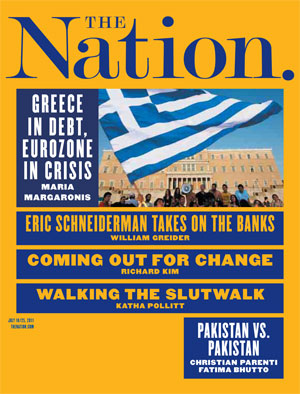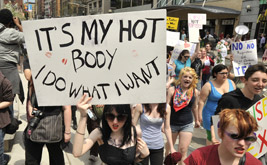Cosima Coinpott’s Debut
San Francisco
As a long, longtime subscriber to The Nation, I congratulate you on cryptic Puzzle No. 3197 [June 20]—the first by the new constructors. The puzzle is brilliant, with great humor and wonderful homage to Frank Lewis at 1 across. Kudos!
BARRY TRAUB
Baltimore
I am halfway through the first Kosman/Picciotto puzzle. I am demoralized, befuddled, tormented and enraged. Thank you! 1 and 29 across is a stroke of gracious genius. The torch is well and fittingly passed.
JOHN C. McLUCAS
Lawrence, Kan.
The new puzzlers are tops! The inaugural cryptic was elegant and lively; the tribute to Frank Lewis in the first clue was perfect; and finding the authors themselves playfully peeking out from two other clues was a delightful surprise. I can’t wait until next week! Candelabra voyage entertains praise (5)!
PAIGE A. NICHOLS
Markowitz Hits the Mark
Alexandria, Va.
I’ve just finished reading “Trials,” on Janet Malcolm, by Miriam Markowitz [June 6]. I am compelled to do what I’ve never done before concerning a book review or essay: I am sending my thanks and congratulations to an author I’ve somehow missed in the past but will not miss again. For the clear-eyed comprehension and scope Markowitz brings to her subject and for the most fluid, elegant prose I’ve read in many years, her writing sets a new, extremely high standard for the art of the essay.
This is simply stunning work. I look forward to reading more—anything—she has written, past and future. In a world overflowing with too many words that say far too little, Markowitz’s work is just, fair-minded—and deeply appreciated.
DIANE R. IVONE
Lake Orion, Mich.
“Trials” contained a reference to the “conditional tense.” There is no such thing. Tense is strictly temporal, broadly divided among past, future and present. Mood is contextual and independent of the temporal. There is a conditional mood, more often referred to as the potential mood, as well as subjunctive, imperative and the default mood, the bland and literal indicative.
The subjunctive is used to indicate that something is in fact not true, but if it were, then some other consequence would flow. He is not guilty. Had he been guilty, then he would have fled. The conditional or potential mood indicates genuine either/or uncertainty. If he is guilty (and we don’t know), then he will flee. The indicative makes up most reportage. He is guilty, and he fled.
There are few publications that preserve any semblance of literary quality. This is one. Keep it that way. Ideas are our children; they should not be sent outside ungroomed.
PATRICK GRIFFIN
Bishop’s Collected Works
Somerville, Mass.
I’m grateful to John Palattella, in his “Shelf Life” of May 16, for once again being a voice of reason, this time vis-à-vis the recent updated and expanded editions of the poetry and prose of Elizabeth Bishop issued by Farrar, Straus and Giroux to celebrate the centennial of her birth. The new Poems corrects errors in text and placement that compromised Bishop’s own Complete Poems (1969) and the posthumous 1983 volume she had nothing to do with; the new Prose replaces FSG’s skimpy posthumous Collected Prose. Previously unpublished facsimile pages punctuate a wide range of new material, from the large-scale Life World Library Brazil in Bishop’s original draft (she disowned the brutally edited published version) to surprisingly revealing and even problematic smaller work, all in their most accurate versions. New covers restore the design and colors Bishop chose for her original Complete Poems. Most reviewers, like Palattella, have welcomed the amplified contents of the new editions, and I applaud his taking to task the radically conservative view of The New York Review of Books, echoing The New York Times Book Review, attacking the new volumes for their very completeness, for including more material than those reviewers deem appropriate to preserve Bishop’s reputation for perfection.
Palattella eloquently argues that, as with any great writer, allowing us access to her fullest output serves not to diminish her stature but “to deepen our sense of Bishop’s ambition and achievement—to better understand how Bishop became Bishop.” Bishop encouraged her students to read everything by any writer they were interested in.
What might surprise even Palattella is that Bishop, the legendary perfectionist, was in favor of the posthumous appearance of her unpublished work. In her will, she granted her literary executors “the power to determine whether any of my unpublished manuscripts and papers shall be published, and if so, to see them through the press.” There is nothing she specifically excludes (and she kept almost all her drafts).
One of the most finished of Bishop’s unpublished poems, a startlingly naked love poem called “Breakfast Song,” which to my mind is one of Bishop’s most piercing and personal later works (the distinguished composer John Harbison set it gloriously to music for the late Lorraine Hunt Lieberson), is attacked in NYRB as “cringe-making.” De gustibus. (Though maybe, as S.J. Perelman put it, “De gustibus ain’t what dey used to be.”) But to argue for the exclusion of this poem, or any of Bishop’s unpublished work, seems to me perversely anti-intellectual and anti-literary. Thank you, John Palattella, for helping us keep our priorities straight.
LLOYD SCHWARTZ, editor, Elizabeth Bishop’s Prose; co-editor, Library of America’s Elizabeth Bishop: Poems, Prose, and Letters
‘Barry’s Boys’
Inver Grove Heights, Minn.
Your fact-checkers must have been nodding off when they let in the first paragraph of Jackson Lears’s review [“Same Old New Atheism,” May 16]. The Barry Goldwater “bit of doggerel” did not just “surface”—it was the work of the Chad Mitchell Trio, an early-’60s folk group. It was the first cut on their album Reflections. I remember playing this song over and over on my mono record player. These guys may not have matched Peter, Paul and Mary in the trio category or Phil Ochs or Pete Seeger in the political song category, but they did some good work, “Barry’s Boys” being just one example. They also put out “The John Birch Society”—“fighting for the right to fight the right fight for the right”—which they recut in 2008 as “The George Bush Society.” They still tour occasionally.
PETER BENNER
Even Homer nods; our fact-checkers never do. They report: “In 1962 Julius Monk produced a revue called Dime a Dozen at a small theater in New York. It featured a song about the college students who supported Goldwater, called ‘Barry’s Boys,’ written by June Reizner (sample verse: ‘We’re the bright young men/Who wanna go back to 1910/We’re Barry’s Boys/We’re the kids with a cause/A government like grandmama’s/We’re Barry’s Boys’). If you Google the song, the Chad Mitchell Trio often comes up, pointing to them as the popularizers of the song.”—The Editors Read More
Our Readers












